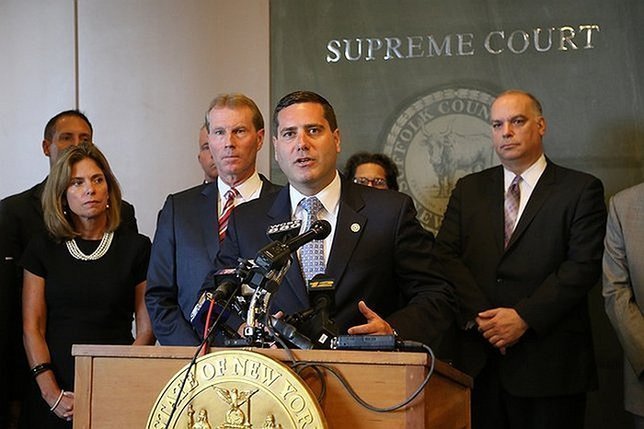Suffolk County District Attorney Timothy D. Sini and Suffolk County Water Authority (“SCWA”) Chairman Patrick G. Halpin today announced the launch of a first-of-its-kind partnership to monitor Suffolk County’s groundwater and identify the source of any contaminants for the potential investigation and prosecution of polluters by the District Attorney’s Office.
“The short term goal here is to identify sources of pollution for potential investigation and criminal prosecution,” District Attorney Sini said. “This sends a very important message that we will not tolerate bad actors contaminating our groundwater. The long term goal is to ensure that we leave our future generations what was left to us: the ability to turn on the faucet and drink that water with peace of mind. I want to thank the Suffolk County Water Authority for this very exciting, strategic partnership, which builds upon the work we are doing in the DA’s Office to fight environmental crime. This is a pledge from both of our organizations that we are committed to protecting our aquifers for future generations.”
“This landmark partnership between SCWA and District Attorney Sini will stop the pollution of our groundwater before it becomes an issue SCWA will have to remediate with expensive water treatment systems,” said SCWA Chairman Patrick G. Halpin. “It is therefore a huge victory for SCWA ratepayers and a huge victory for Long Island’s environment.”
The partnership is the latest initiative implemented by the District Attorney’s Office to combat environmental crimes in Suffolk County. The monitoring of groundwater for pollutants was highlighted by a landmark Special Grand Jury report issued by the Office in 2018, which concluded that protecting the environment of Suffolk County is of paramount importance in light of the fact that Long Island sits atop an aquifer, which is the sole source of drinking water for its residents.
District Attorney Sini and Mr. Halpin announced today that the District Attorney’s Office and SCWA will enter into a memorandum of understanding (“MOU”) in which the SCWA will provide groundwater data at no cost to investigators in the District Attorney’s Office to assist with its investigation of environmental crimes. SCWA will also map and model the flow of groundwater in Suffolk County to enable the District Attorney’s Office to identify and investigate sources of pollution.
If the District Attorney’s Office becomes aware of a potential contamination site, the MOU allows for the SCWA to develop monitoring wells and conduct groundwater and soil testing to determine quality of groundwater and soil in that location. The SCWA will also analyze any groundwater samples collected by the District Attorney’s Office in the course of its investigations.
SCWA currently operates 241 pump stations with 593 active wells in its distribution system located throughout Suffolk County. The data that will be provided and analyzed through this partnership is generated in the SCWA’s state-of-the-art drinking water testing laboratory, which analyzes more than 75,000 samples per year for 400 different chemicals.
District Attorney Sini has made the investigation and prosecution of environmental crimes a top priority of the Office. In 2018, District Attorney Sini empaneled a Special Grand Jury to investigate these crimes, which resulted in the largest illegal dumping case in New York State history, known as “Operation Pay Dirt,” charging 30 individuals and 10 corporations in connection with a scheme to illegally dispose of solid waste and construction and demolition material at locations across Long Island. During its second phase, the Special Grand Jury considered and made recommendations as to legislative, executive, and administrative action to address environmental crimes. In collaboration with State lawmakers, several of those recommendations were adopted and signed into law in December 2020.










